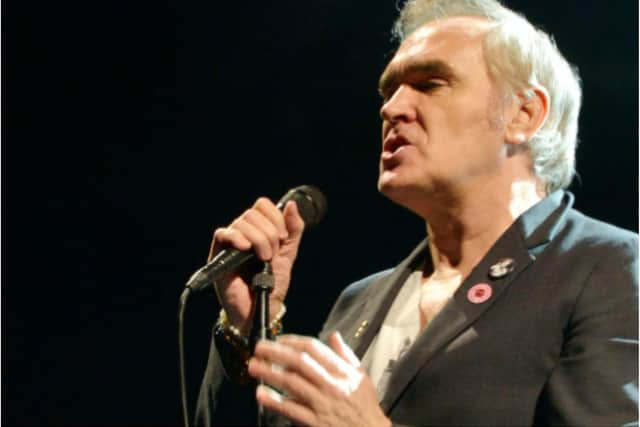Morrissey in Doncaster: Singer's controversial career since 1991 Dome gig
and live on Freeview channel 276
It will be the third time the former frontman of The Smiths has played in Doncaster, appearing at The Dome in 1991 and then again in 2008.
Details of the date and venue have yet to be released, with Morrissey saying full details of the ten date UK tour will be unveiled in due course.
Advertisement
Hide AdAdvertisement
Hide AdWe’ve delved back into the archives to revisit those past Doncaster gigs, his previous appearances in South Yorkshire with The Smiths – and his controversial career that has divided opinion down the decades.
He of course came to fame as lead singer of The Smiths, emerging out of Manchester in the early 1980s with the band’s brand of jangly guitar anthems entwined with Morrissey’s gloomy yet witty lyrics which made the band one of the most influential bands of the decade.
The group’s first South Yorkshire date was in 1983 at the University of Sheffield and a further concert followed at the same venue a year later.
Also in 1984, the band, famed for hits such as This Charming Man, Panic and Girlfriend In A Coma, made the switch to the bigger Sheffield City Hall, a venue they would also play in 1985 – their last South Yorkshire date ahead of an acrimonious break-up in 1987.
Advertisement
Hide AdAdvertisement
Hide AdBy 1991, Morrissey had established himself as a solo star, with hits such as Suedehead and Everyday Is Like Sunday.


It was on 25 July 1991 that he arrived at The Dome, then a venue in its infancy, in support of his album at the time, entitled Kill Uncle.
The venue was packed, many of the audience adopting the singer’s trademark quiff, NHS specs, baggy cardigans and swinging gladioli around – such was the demand for the singer’s favourite flower that teenagers stripped the shelves of the nearby Asda bare of flowers to wave in front of the star.
The 19-song set that night steadfastedly refused to delve into his Smiths past, focussing purely on solo material such as Interesting Drug, The Last of the Famous International Playboys, November Spawned a Monster, Piccadilly Palare and Our Frank as well as a cover of The Jam’s That’s Entertainment.
Advertisement
Hide AdAdvertisement
Hide AdIt was a different story when he returned on January 30, 2008.
While still missing out on Smiths classics such as Hand In Glove and The Boy With The Thorn In His Side, this time he did dip into his back catalogue, presenting his own versions of How Soon Is Now?, Stop Me If You Think You've Heard This One Before, Stretch Out and Wait and Death of a Disco Dancer in amongst the solo material.
Never shy at putting forward his views, right from the very start of his career and even before it, in lengthy letters to music magazine NME, Morrissey seems to have courted controversy at every turn – endorsing vegetarianism and animal rights, criticising royalty and prominent politicians
But it is accusations of racism and far right associations that have continued to dog him for the past three decades.
Advertisement
Hide AdAdvertisement
Hide AdHowever, he has constantly rejected the accusations – and won a libel action forcing an apology from NME, saying: "We do not believe [Morrissey] is a racist."
Various sources accused Morrissey of racism for making reference to the National Front, a far-right political party, in his 1992 song "The National Front Disco", although it has been argued that this criticism ignored the ironic context of the song, which pitied rather than glorified the party's supporters.
Lyrics from Morrissey songs such as "Bengali in Platforms" and "Asian Rut" added fuel to the fire and NME also accused Morrissey of racism on the basis of the imagery he employed during his 1992 performance at the Madstock festival at Finsbury Park in north London – including images of skinhead girls as a backdrop, and wrapping himself in a Union flag.
In October 2017, he expressed the view that the 2017 UKIP leadership election had been rigged against anti-Islam activist Anne Marie Waters and in April 2018 he endorsed Waters' new far-right party, For Britain, subsequently wearing a party badge during several performances in New York City in 2019.
Advertisement
Hide AdAdvertisement
Hide AdHis apparent support for the For Britain party saw adverts of his album California Son withdrawn from railway stations and several record stores refusing to stock the album.
In June 2018, Morrissey reaffirmed his support for Waters and For Britain, stating "she believes in British heritage, freedom of speech, and she wants everyone in the UK to live under the same law. I find this compelling."
At the same time, Morrissey also expressed comments criticising the treatment of anti-Islam activist Tommy Robinson, and said: "It's very obvious that Labour or the Tories do not believe in free speech … I mean, look at the shocking treatment of Tommy Robinson."
In June 2019, Morrissey rejected further accusations of racism against him, saying, "The word is meaningless now. Everyone ultimately prefers their own race—does this make everyone racist?"
Advertisement
Hide AdAdvertisement
Hide AdWhatever your view, it is undeniable that Morrissey is one of the biggest and most divisive music stars Britain has ever seen – with a distinct Marmite ‘love him, or hate him’ approach.
One thing is for certain, his upcoming Doncaster concert is very likely to be a complete sell out and controversial as ever.